Memoir
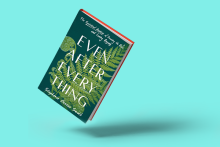
IF YOU WROTE down your past year’s most significant personal joys and losses on a timeline, how might they line up with the liturgical calendar — Advent, Christmas, Epiphany, Lent, Holy Week, Eastertide, and Ordinary Time? Placing these two calendars side by side, what might you find? Stephanie Duncan Smith digs into these questions in her memoir Even After Everything. For Duncan Smith — and likely for most of us — “Sometimes our personal moments converge with these natural and sacred seasons in profound, meaning-rich ways. And sometimes they clash with unbearable disparity.”
Duncan Smith shares her own story of loss and love with unflinching honesty, even and especially where it seems to clash with the Christian story. The places of dissonance are, for her, both a “dizzying problem” and a “place of divine encounter.” She invites us to dive into the dissonance with her as she wrestles out a sort of reconciliation — a renewed understanding of the Christian story that makes room, so much room, for every human grief. “The promise has never been smooth nor safe passage,” Duncan Smith writes. “The divine promise is presence.”
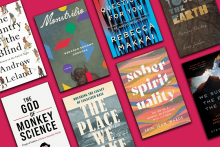
Each book, whether subtly or overtly, shows readers how to build community in the face of both real and existential danger.
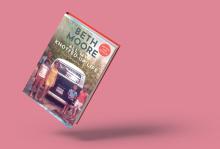
“GRIEF TAKES SO much energy. I can feel it even in my fingers.”
These are the words that drew me to Christian author and speaker Beth Moore’s memoir, All My Knotted-Up Life. She posted the sentences as two separate tweets in the wake of her brother’s unexpected death, less than three weeks before her memoir’s release.
Through her Living Proof Ministries, Moore is one of the most prominent white evangelical women in the U.S. I braced myself as I entered the book, but she delivers stories of resilience with all the charm, sweetness, and humor one would expect from a memoirist with roots in Arkadelphia, Arkansas.
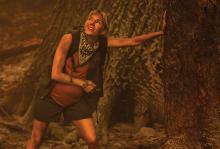
New Earth?
The TV show Extrapolations, featuring Meryl Streep and Forest Whitaker, offers eight terrifying visions of how climate-changed humanity’s unchecked consumption will harm Earth. The interwoven stories aim to inspire climate action, even as they disturb.
Apple TV+

When I met bell hooks three years ago, I had all four of my children in tow and I wasn’t sure what to say. A mutual friend arranged a short visit to her home. My heart was bursting with gratitude for all the ways hooks wove race, gender, class, faith, place, and love into her work. My mind was racing with ways to express some fraction of my appreciation and awe.

The scripture-inspired title of Obama’s latest book comes from the idea that a better America ― one that lives more fully into its democractic promise ― is still possible. “[E]ven if we experience hardships and disappointments along the way, that I at least still have faith we can create a more perfect union. Not a perfect union, but a more perfect union,” Obama told CBS 60 Minutes correspondent Scott Pelley in a Nov. 16 interview.
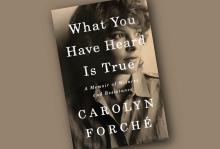
CAROLYN FORCHÉ’S story begins more than 40 years ago, when the then-27-year-old poet opens her apartment door in California to a stranger from El Salvador. Leonel Gómez Vides—“Leonel,” as she refers to him throughout her book—spends several days outlining the situation in his country and making his case for Forché to come witness the roots of a revolution.
That Forché accepts such a calling, from January 1978 through March 1980 and for more than 40 years beyond, attests not only to her grit but also to her belief in the sanctity of the human spirit and the power of truth.
An awakening usually connotes a positive state of consciousness, yet Forché’s experience calls her to a grim, nightmarish landscape. Once her plane touches down in Ilopango, El Salvador, she ventures into a world in which nearly one in 10 children dies before the age of 5 and 80 percent of the population has no running water, electricity, or sanitation. To read Forché’s rich prose is to travel alongside her through the jungle, where she learns to squat over open pits to relieve herself, and follow her into palatial, private quarters, where she washes away the filth of the road before meeting with the military and civic leaders who want her dead. Beyond the poverty, the country devolves into a hell wherein mutilated bodies appear in the streets and political prisoners are kept in small cages, like animals.

In the summer of 430, the great Christian writer and bishop Augustine of Hippo lay dying as barbarians besieged his North African city – basically a mop-up operation in the slow-motion fall of the Roman Empire.
Today, in the fall of the year 2016, a lot of Christians can relate.
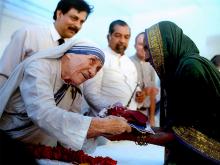
The Rev. James Martin is a Jesuit priest and popular author who wrote about his lifelong fascination with the saints and the many aspects of sainthood in the Catholic tradition in the best-selling book My Life With the Saints.
Loyola Press is issuing a 10th anniversary edition of Martin’s memoir in September, which also coincides with the Sept. 4 canonization of Mother Teresa of Calcutta, who even during her lifetime – she died in 1997 – was regarded by millions as a “living saint” for her work with the destitute in India and around the world.

Arriving at Amen, the forthcoming memoir-infused guide to spiritual practices by Leah Libresco, reads like a fantastic series of blog posts combined into a less-spectacular guide for small groups getting their hands dirty with spiritual practices. Oddly, Leah seems to respect her audience a bit too much by assuming that they are as geeky and morally driven as her. This limits Arriving at Amen’s usefulness in the pastoral context, which it seems marketed and designed for — but makes it more interesting for me.
Leah has a great internet presence — from her blog Unequally Yoked to a new radio show Fights in Good Faith and now reporting and doing analysis for FiveThirtyEight. Leah is, basically, a very liberally well-educated math nerd who turns to religion in the same way that she turns to everything – full-voiced and with the intention to win.
Arriving at Amen riffs on some historic spiritual practices, all billed as Roman Catholic (though I, as a cranky reformed Presbyterian, can still get some mileage out of them) such as the Divine Office, examen, lectio divina, and several others.
Leah has lots of helpful tips here. The Divine Office (a set structure of prayers that I’ve found healthy in my own life) can become a means to organize your time and a way to transition to and from work on your commute. She suggests using the Jesuit daily self-reflection of the examen as way to proactively think about virtues that you can cultivate rather than as another opportunity to spiral into guilt. She even rethinks lectio divina, the practice of meditation on scripture, by suggesting that the reader translate scripture into another language as she does with American Sign Language.
All of this is helpful advice — but it also demonstrates the scattershot nature of Arriving at Amen.
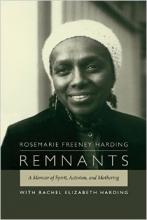
Rosemarie Freeney Harding describes the reaction of her friend—Albany, Georgia-based civil rights leader Marion King—to a physical attack.
In the summer of 1962, in the middle of the Albany campaign, Marion and I were both pregnant. During the campaign, Marion often visited movement workers who were jailed in local facilities throughout Dougherty and Terrell counties—taking them food, checking on conditions where they were kept, relaying messages. On one occasion as she exited a jail, a policeman who felt she was not moving fast enough kicked her in the back so that she fell to the ground. Marion fell so hard that she lost the baby.

They call her the "Flying Squirrel" — Gabby Douglas, the pint-sized fire-cracker who won two gold medals (and the hearts of millions) at the 2012 Summer Olympics.
Gabby can flip, tumble, vault, balance, swing, totally stick the landing, throw out the first ball at a Dodgers game, charm Jay Leno and Howard Stern (try that, Michael Phelps!), and high-five the First Lady — all the while exuding confidence, good humor and the greatest of ease through her cajillion-watt smile.
So, what's next for the 16-year-old wonderkid?
A tell-all book... about her Christian faith.
Gabby is working on her first book — a memoir titled Grace, Gold, and Glory: My Leap of Faith — which is expected to be published at the end of the year, according to an announcement made today by the Christian publishing house, Zondervan.
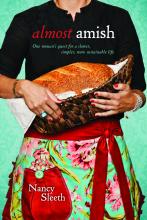
If I had seen just the title of Almost Amish, I probably wouldn't have been attracted to it: I'm not a fan of Amish fiction, and I've heard too much about Amish puppy mills.
If I'd also noticed the name of the author, however, I might have picked it up: several years ago I met the Sleeths at the home of mutual friends, and I greatly respect the choices they have made about a simpler, more hospitable lifestyle.
Editor's Note: Earlier this week, our intrepid blogger/reporter/resident-God-Nerd Christian Piatt sat down with the makers of the highly-anticipated film Blue Like Jazz — Donald Miller, director Steve Taylor and Marshall Allman, the actor who portrays protagonist "Don" in the screen adaptation of Miller's best-selling memoir — to talk about faith, film and ... fate.
Blue Like Jazz premiered at the SXSW Festival in Texas earlier this month and opens nationwide April 13. Piatt caught up with the filmmakers in a Colorado Springs theater where they were hosting a sneak-peek screening and persuaded the gents to unpack the story of the-little-film-that-could and the Spirit that buoyed them along the way.
The wide-ranging interview covers everything from John Coltrane's "A Love Supreme" and what Miller calls "dangerous theological ideas" to the astounding grace of God and peanut butter cups. Fascinating and funny, the conversation with the hearts and minds behind Blue Like Jazz is a humdinger.
Watch the interview in its entirety and read Piatt's reflections on the film and his conversation with its makers inside the blog ...
"There are people who struggle with not being understood; God is not one of them."
~ Donald Miller to Christian Piatt
in 'Blue Like Jazz' - The Sojourners Interview
coming Wednesday on God's Politics
++++++++++++++++++++++++++++++++++++
Earlier this week, our intrepid blogger/reporter/resident-God-Nerd Christian Piatt sat down with the makers of the highly-anticipated film Blue Like Jazz — Donald Miller, director Steve Taylor and Marshall Allman, the actor who portrays protagonist "Don" in the screen adaptation of Miller's best-selling memoir — to talk about faith, film and ... fate. The far-ranging interview covers everything from John Coltrane's "A Love Supreme" and what Miller calls "dangerous theological ideas" to the astounding grace of God and peanut butter cups. Fascinating and funny, the conversation with the hearts and minds behind Blue Like Jazz is a humdinger you won't want to miss.
But because we like you a whole lot , we've prepared a wee taste of what's to come ... inside the blog.

I’ve been writing this week about inspired vision and embracing radical change even in the face of the death of present systems. But the experience is different when applying the same principles to our own lives. The following is taken from my upcoming memoir, PregMANcy, due out in a few weeks. The setting is about four years ago, when my son, Mattias, decided his latest obsession would be death.
______________________________________________
I’ve noticed that Mattias has been more fearful in general lately, which concerns me. Part of it, I think, has to do simply with the fact that he’s smart enough to think through possible scenarios. As I’ve observed with him a number of times before in the last two years, he’s able to process a whole lot more intellectually than he can process emotionally. Eventually, his emotional wisdom should have plenty of opportunity to catch up, but for a four-year-old, any gap in development is more pronounced.
Two years ago, when he was only a year and a half old, Mattias was jumping from the side of the pool into my arms and going underwater. Last summer, he and his cousin spent most of every waking hour in their grandmothers’ pool, diving to the bottom for toys and to do tricks. Now, with floaties on both arms, a mask and a snorkel, it’s all I can to do get him off of the top step in the shallow end.
What the hell happened?
Ms. Maathai's life and work are examples of the truth of the adage, "Nothing is more powerful than a made up mind." She made up her mind that planting trees is a way to make life better for rural women and for all of humankind. She wanted to plant one tree for every person in Kenya. An the Green Belt Movement has planted tens of millions of trees.
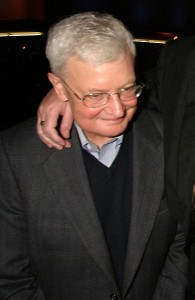 "I have no interest in megachurches with jocular millionaire pastors," Ebert writes. "I think what happens in them is sociopolitical, not spiritual. I believe the prosperity gospel tries to pass through the eye of the needle. I believe it is easier for a Republican to pass through the eye of a needle than for a camel to get into heaven. I have no patience for churches that evangelize aggressively.
"I have no interest in megachurches with jocular millionaire pastors," Ebert writes. "I think what happens in them is sociopolitical, not spiritual. I believe the prosperity gospel tries to pass through the eye of the needle. I believe it is easier for a Republican to pass through the eye of a needle than for a camel to get into heaven. I have no patience for churches that evangelize aggressively.
"I have no interest in being instructed in what I must do to be saved. I prefer vertical prayers, directed up toward heaven, rather than horizontal prayers, directed sideways toward me," he continued. "If we are to love our neighbors as ourselves, we must regard their beliefs with the same respect our own deserve."
